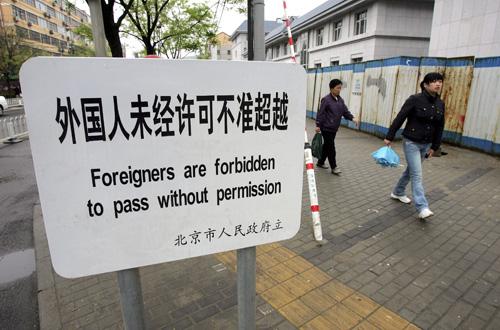Olympics attendees face tight restrictions

Residents walk past a sign which forbids foreigners to pass in Beijing on April 21. A document issued Monday by the Beijing organizing committee spells out guidelines for foreigners at the Olympics. Greg Baker, The Associated Press
June 3, 2008
BEIJING – Foreigners attending the Beijing Olympics better behave – or else.
The Beijing Olympic organizing committee issued a stern, nine-page document Monday that covers 57 topics. Written in Chinese only and posted on the official Web site, the guide covers everything from a ban on sleeping outdoors to the need for government permission to stage a protest.
Visitors also should know this:
-Those with “mental diseases” or contagious conditions will be barred.
-Some parts of the country are closed to visitors – one of them Tibet.
Get The Daily Illini in your inbox!
-Olympic tickets are no guarantee of a visa to enter China.
Fearing protests during the Aug. 8-24 Olympics, China’s authoritarian government has tightened controls on visas and residence permits for foreigners. It has also promised a massive security presence at the games, which may include undercover agents dressed as volunteers.
The guide said Olympic ticket holders “still need to visit China embassies and consulates and apply for visas according to the related rules.”
The government hopes to keep out activists and students who might stage pro-Tibet rallies that would be broadcast around the world. It also fears protests over China’s oil and arms trade with Sudan, and any disquiet from predominantly Muslim regions in western China.
The document also warns against the display of insulting slogans or banners at any sports venue. It also forbids any religious or political banner at an Olympic venue that “disturbs the public order.”
The guidelines seem to clash with a pledge made two month ago by International Olympic Committee president Jacques Rogge, who said athletes could exercise freedom of speech in China. He asked only that athletes refrain from making political statements at certain official Olympics venues.
“Freedom of expression is something that is absolute,” Rogge said in Beijing in April. “It’s a human right. Athletes have it.”
The detailed document is titled: “A guide to Chinese law for Foreigners coming to, leaving or staying in China during the Olympics.” This appears under the slogan of the Beijing Olympics: “One World, One Dream.”
For months Chinese authorities denied there had been any change to visa regulations, but recently acknowledged that rules had been amended.
The rules published Monday say entry will be denied to those “who might conduct acts of terrorism, violence and government subversion … and those who might engage in activities endangering China’s national security and national interest.”
The document also warns foreigners that not all areas of the country are open to visitors. One such area is Tibet, which is also off limits to journalists.
“Not all of China is open to foreigners, and they shall not go to any venue not open to them,” the statement said..
The guide also threatens criminal prosecution against anyone “who burns, defaces … insults or tramps on the national flag or insignia.”
For those planning on sleeping outdoors to save a little money – forget it. This is banned to “maintain public hygiene and the cultured image of the cities.”






